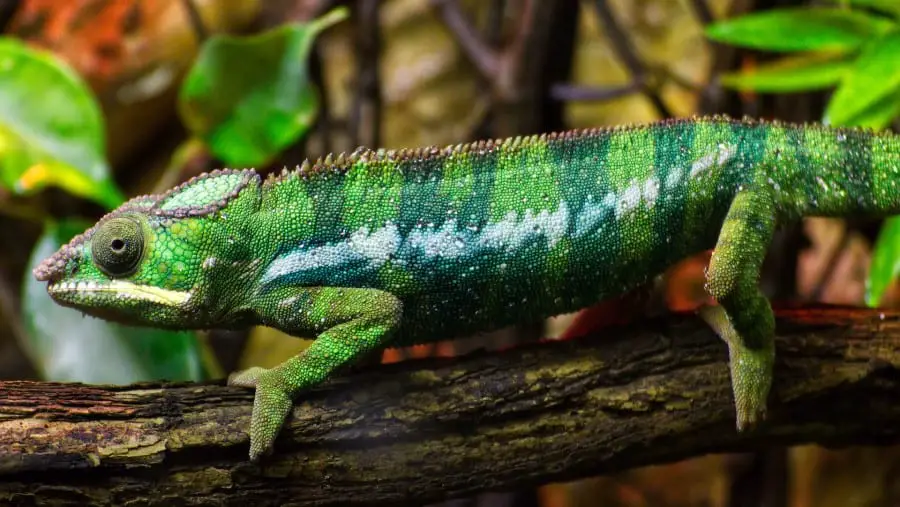
Have you ever seen chameleons coming out as underweight? Maybe chameleons are also health-conscious and want to own a supermodel body!
Now that I think about it, it is pretty unreasonable to assume that. We all know that chameleons can become overweight, but is the opposite possible?
Chameleons can become underweight. This usually stems from issues of feeding but it is also possible that the chameleon might feel scared or be blind. Being underweight may also mean that your chameleon is dying as well so be aware.
If your chameleon looks a tad little smaller than you think it should, it might not be eating properly.
Maintaining a proper weight will help your chameleon prevent health issues that will shorten its supposed lifespan.
To do that, we must first know why a chameleon can become underweight.
Why Do Chameleons Become Underweight?
A chameleon doesn’t just become underweight out of nowhere. Chameleons were hardwired to survive in the wild where animals have to constantly fight for food.
Not to mention the fact that they are omnivores. This means that they eat almost everything, so food shouldn’t be scarce to them at all.
They are very effective hunters who can very easily get a meal just with their tongue alone.
You Aren’t Feeding Your Chameleon Right
Many pet owners aren’t equipped with the right knowledge to feed their chameleons right. Some owners even think that they can feed chameleons just about anything as long as it has some kind of nutritional value.
Another common problem that happens between chameleon owners is forgetting to feed their pet chameleons. Sometimes, we tend to forget that animals need a constant supply of food as we do.
Some owners may have busy schedules which make them unable to feed their pets adequately. In fact, some owners simply go out on a trip and don’t leave enough food for their chameleons to survive the week.
It may also be possible that an owner isn’t offering a wide enough variety of food to their chameleons. This might bore the chameleon to the point that it becomes picky with its food and stops eating when fed the same thing too often.
However, this is highly unlikely as we have established that chameleons are hardwired to survive. They will eat whenever they find the need to, but that doesn’t mean it isn’t possible still.
Your Chameleon Is Scared
Another reason why a chameleon would be underweight is that it is very scared of something. Chameleons have a very strange ability to be able to suck their stomachs in to make themselves look smaller.
It’s not used to make them look better but it helps them to look smaller and avoid being seen by others. Chameleons are known to be very bad at handling stress.
This means it is very easy to scare them or make them afraid of something.
They will do whatever they can to avoid attention and if they deem it necessary, they will make themselves physically smaller.
This includes starving themselves if they think sucking their stomachs in alone isn’t doing the job.
Your Chameleon Is Blind Or Getting There
If your chameleon just doesn’t eat much or at all, it may be an indication that it’s starting to become blind. Chameleons are very skeptical creatures who don’t put things up to faith.
If they can’t see, they won’t eat. This is because they can’t tell if they are eating the right thing. It is not hard to find something poisonous and put it in your mouth when you are roaming around in the wild.
After living for millions of years in the wild, chameleons know better than to just eat anything without looking at it first. Another reason is that they rely highly on the accuracy of their tongues.
These creatures are very accurate with their tongues and solely catch prey with them. If they can’t see their prey, they can’t use their tongues to catch them.
Parasites Are Attacking Your Chameleon
It is very common to find some parasites living in a chameleon’s body. They coexist with each other and have no trouble finding balance assuming everything is alright.
This all falls apart when a chameleon becomes ill stressed, or unhygienic enough to let the parasites take over. When this happens, the parasites will cause them to lose weight rapidly and suddenly.
First, the parasites will eat whatever food that’s fed to your chameleon, then they will start to feed on your chameleon itself.
Aging Chameleons
Time doesn’t wait for everyone, and nothing lasts forever. Chameleons will eventually age to the point where they start to wither away and die.
An indication that they are dying is if they start to eat lesser and lesser. They will start losing their appetite and slowly shut down. In this case, there isn’t much you can do about this, other than let time do its work.
Just know that you have given the best you could to your chameleon. Now that we know the whys, how can we tell if a chameleon is underweight?
How to Tell If A Chameleon Is Underweight?
Other than the obvious smaller size, there are several ways to tell if a chameleon is underweight. First of all, being able to see their ribs is not a sign of being underweight.
It is very normal to be able to see their ribs so don’t freak out just yet. Secondly, chameleons have kind of a flat body shape and don’t show a belly like how some other animals do.
To summarize, it is pretty hard to tell if a chameleon is underweight. I can show you the ropes though!
Obvious Bone Ridges
A very simple way to tell if a chameleon is underweight is by looking at its back.
The bone ridge runs across their backs which makes them look like mini dinosaurs or dragons.
A chameleon is probably on the skinnier side if you can see their bone ridge very clearly.
Flat Belly
If you see your chameleon constantly having a flat belly, it is an indication that it’s underweight. Chameleons in a healthy weight range should have a small belly rounding out.
I know I just told you that chameleons are kind of flat and have no belly, but I did say kind of. They aren’t exactly flat. When a chameleon is relaxed, its belly should be a little rounded like a small mountain in the plains.
Their bellies should never be just a straight line from their front legs to their back legs. Now that we know the signs, can we prevent them from becoming underweight?
Preventing Chameleons From Being Underweight
The easiest way will always come from the pet owner themselves. Study up on how to feed your chameleon properly to ensure that they are getting the right nutrition.
Chameleons love to hunt live bugs as food so try to feed them as much of that as possible. Moreover, change up their diet every once in awhile from crickets to roaches to even worms.
Don’t just give them the same boring thing every day, even you’ll get bored with buying them. Try to gut load their food instead of the chameleons themselves.
This helps boost the nutritional value of what they eat. Include things like leafy greens and fruits, so that the livestock can absorb them and directly transfer them to your chameleon.
If you still feel that they aren’t getting enough nutrition, don’t be shy to use nutritional powers to cover their food as well. Supplement dust includes various vitamins and calcium which keep your chameleon strong and healthy.
Use automatic feeders, so that you don’t have to constantly remember to feed your chameleon. Time the feeders to feed your chameleon at an appropriate time so that you don’t just feed them constantly as well.
Other than that, check if your chameleon is becoming blind, or even prevent it by using the right bulbs for the enclosure.
Don’t scare your chameleon or it might start to starve itself to look smaller. It is unlikely that this will happen but scaring them isn’t good in the first place anyway.
Conclusion
A chameleon can become overweight due to various reasons. Knowing what the reasons are will help you root out the problem.
It is important to know the signs of your chameleon being underweight, so you can act accordingly.
You don’t want to let your chameleon become underweight, do you?


